科普版英语六年级上册L2六年级上册英语第二课(2020年最新)
- 格式:pdf
- 大小:1.60 MB
- 文档页数:17
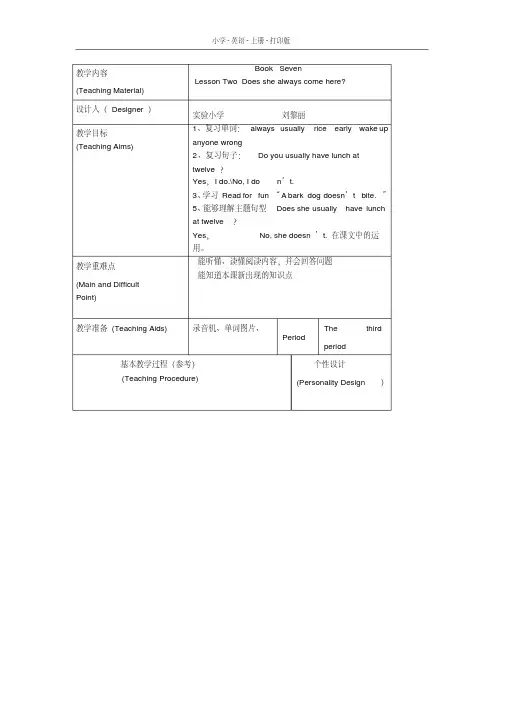
教学内容(Teaching Material)Book SevenLesson Two Does she always come here?设计人(Designer)实验小学刘黎丽教学目标(Teaching Aims) 1、复习单词:always usually rice early wake up anyone wrong2、复习句子:Do you usually have lunch at twelve?Yes,I do.\No, I do n’t.3、学习Read for fun “A bark dog doesn’t bite.”5、能够理解主题句型Does she usually have lunch at twelve?Yes,No, she doesn’t.在课文中的运用。
教学重难点(Main and Difficult Point) 能听懂、读懂阅读内容,并会回答问题能知道本课新出现的知识点教学准备(Teaching Aids) 录音机、单词图片、PeriodThe thirdperiod基本教学过程(参考)(Teaching Procedure)个性设计(Personality Design)Free talk:学生表演课前准备的对话(叫三组学生)Step1 Revision1听写单词:always usually rice early wakeup anyone wrong before2复习句型Does she usually have lunch at twelve?Yes,No, she doesn’t(用短语watch T v do one’s homework do sports play football进行替换练习)Step2 PresentationLean the new words: put on afraid be afraid of suddenly begin bark old sayingbitePractice 教师说汉语学生说英语或反之New content1 Introduce学生默读5分钟阅读内容教师简单介绍本课阅读的大概内容2.Listen to the tapeIf you don’t know the story so well now ,please listen to the tape carefully.(学生再次了解课文)3、Reading and comprehensiona. If you want to understand it wellenough,you must read it by yourself(进一步了解课文,同时训练学生的阅读能力)b. Reading the quedtions at first then readthe text again, then answer the questions.(带着问题去读,促使学生在阅读的同时加以理解,培养学生的阅读理解能力)4 教师边讲重点词汇学生边记录go for a walk put on go withgo out Don’t be afraid of.the old saying A barking dog doesn’t bite.Questions:1. Does Mr Brown go for a walk after supperevery day?2.Who go with him?3.Is Ann happy to go out with her father?4.Suddenly what can you see?5.Is Ann afraid of the dog ?6.What did Mr Brown say ?7.What did Ann say?学生回答以上问题Step3.Practice书上Listen and match练习册听力部分Step4 HomeworkFinish off the exercises on the exercise book.教学后记(Postscript)。
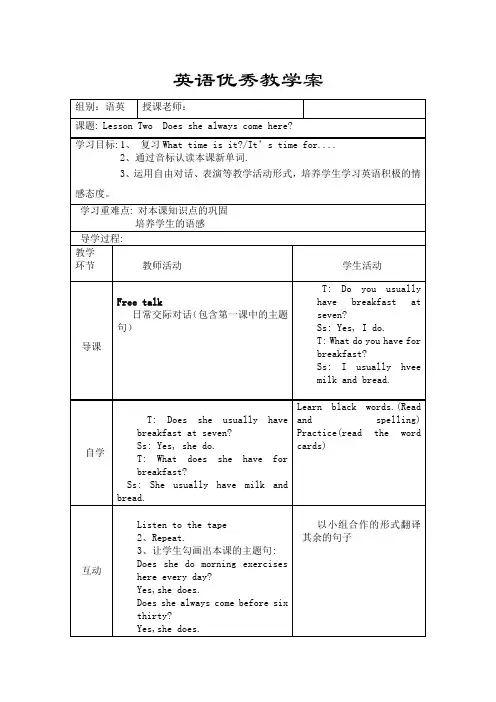
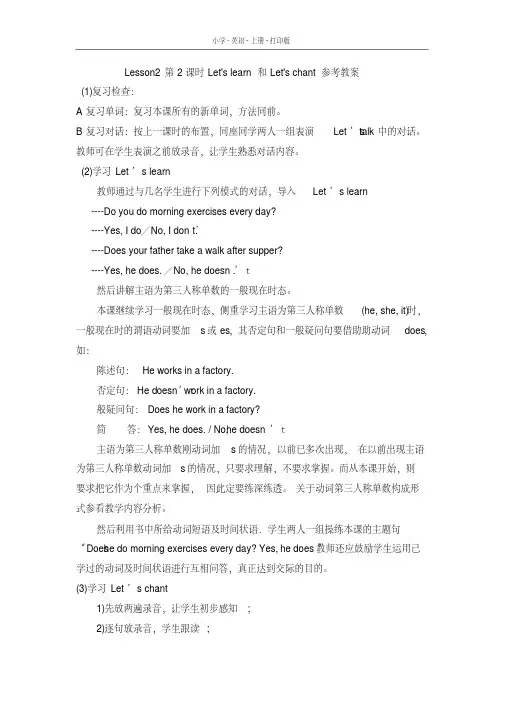
Lesson2 第2课时Let's learn和Let's chant参考教案(1)复习检查:A复习单词:复习本课所有的新单词,方法同前。
B复习对话:按上一课时的布置,同座同学两人一组表演Let’s talk中的对话。
教师可在学生表演之前放录音,让学生熟悉对话内容。
(2)学习Let’s learn:教师通过与几名学生进行下列模式的对话,导入Let’s learn----Do you do morning exercises every day?----Yes, I do/No, I don’t.----Does your father take a walk after supper?.----Yes, he does. /No, he doesn’t然后讲解主语为第三人称单数的一般现在时态。
本课继续学习一般现在时态,侧重学习主语为第三人称单数(he, she, it)时,一般现在时的谓语动词要加s或es,其否定句和一般疑问句要借助助动词does,如:陈述句:He works in a factory.work in a factory.否定句:He doesn’t般疑问句:Does he work in a factory?简答:Yes, he does. / No, he doesn’t主语为第三人称单数刚动词加s的情况,以前已多次出现,在以前出现主语为第三人称单数动词加s的情况,只要求理解,不要求掌握。
而从本课开始,则要求把它作为个重点来掌握,因此定要练深练透。
关于动词第三人称单数构成形式参看教学内容分析。
然后利用书中所给动词短语及时间状语.学生两人一组操练本课的主题句教师还应鼓励学生运用己“Does he do morning exercises every day? Yes, he does”学过的动词及时间状语进行互相问答,真正达到交际的目的。
(3)学习Let’s chant:1)先放两遍录音,让学生初步感知;2)逐句放录音,学生跟读;3)教师领读,学生跟读并译成汉语;4)学生跟录音反复练习,直到熟练为止。
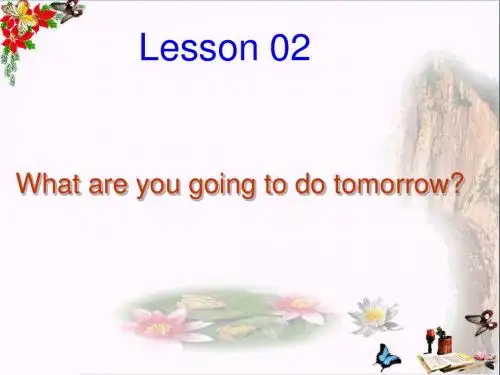
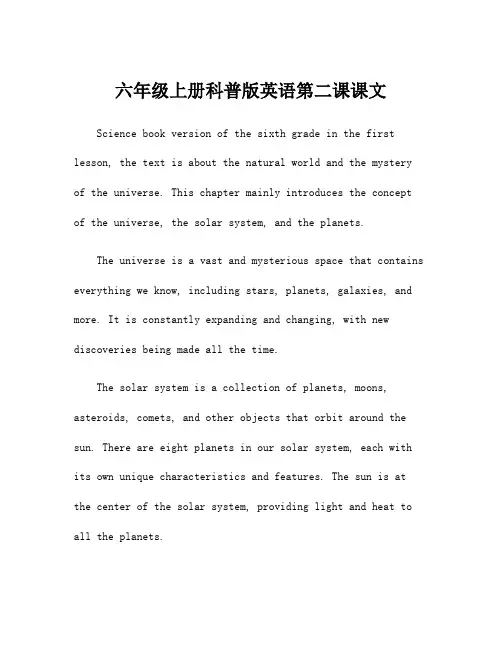
六年级上册科普版英语第二课课文Science book version of the sixth grade in the first lesson, the text is about the natural world and the mystery of the universe. This chapter mainly introduces the concept of the universe, the solar system, and the planets.The universe is a vast and mysterious space that contains everything we know, including stars, planets, galaxies, and more. It is constantly expanding and changing, with new discoveries being made all the time.The solar system is a collection of planets, moons, asteroids, comets, and other objects that orbit around the sun. There are eight planets in our solar system, each with its own unique characteristics and features. The sun is at the center of the solar system, providing light and heat to all the planets.The planets in our solar system are Mercury, Venus, Earth, Mars, Jupiter, Saturn, Uranus, and Neptune. Each planet hasits own orbit, size, and composition, making them fascinating objects of study for scientists and astronomers.In addition to the planets, there are also many moons, asteroids, and comets in our solar system. Moons are natural satellites that orbit around planets, while asteroids and comets are small rocky or icy objects that orbit the sun.The study of the universe and the solar system is an important and exciting field of science. Scientists and astronomers use telescopes, probes, and other tools toobserve and study the natural world and the mysteries of the universe.As we continue to explore and learn more about the universe, we will undoubtedly discover new and amazing things that will expand our understanding of the natural world andour place in the universe. Science is constantly evolving,and there is still so much more to learn and discover about the universe and the world around us.。
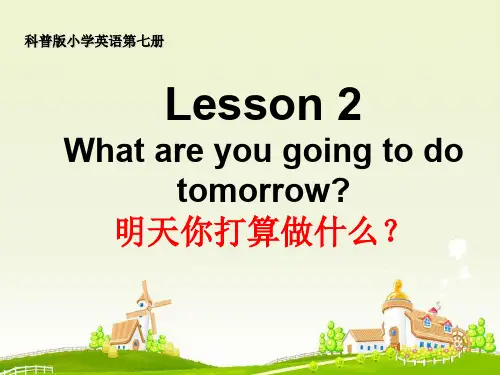
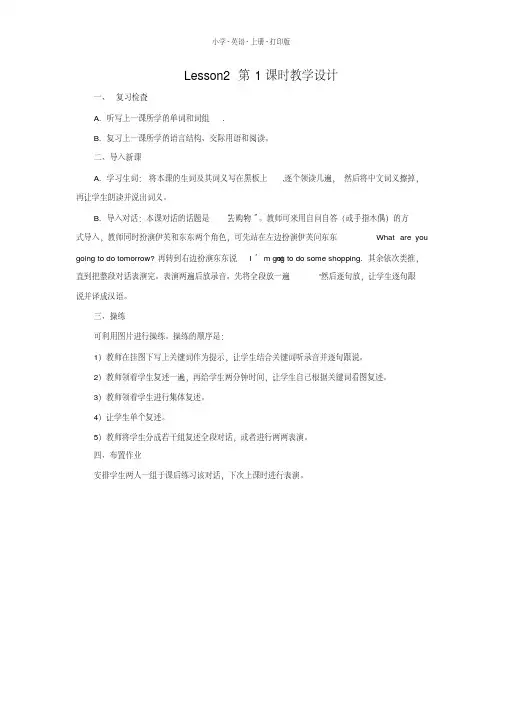
小学-英语-上册-打印版
Lesson2 第1课时教学设计
一、复习检査
A. 听写上一课所学的单词和词组.
B. 复习上一课所学的语言结构、交际用语和阅读。
二、导入新课
A. 学习生词:将本课的生词及其词义写在黑板上,逐个领读几遍,然后将中文词义擦掉,再让学生朗读并说出词义。
B. 导入对话:本课对话的话题是“去购物”。
教师可来用自问自答(或手指木偶)的方
式导入,教师同时扮演伊芙和东东两个角色,可先站在左边扮演伊芙问东东What are you going to do tomorrow?再转到右边扮演东东说I’m goi ng to do some shopping. 其余依次类推,直到把整段对话表演完。
表演两遍后放录音。
先将全段放一遍'然后逐句放,让学生逐句跟
说并译成汉语。
三、操练
可利用图片进行操练。
操练的顺序是:
1)教师在挂图下写上关键词作为提示,让学生结合关键词听录音并逐句跟说。
2)教师领着学生复述一遍,再给学生两分钟时间,让学生自己根据关键词看图复述。
3)教师领着学生进行集体复述。
4)让学生单个复述。
5)教师将学生分成若干组复述全段对话,或者进行两两表演。
四、布置作业
安排学生两人一组于课后练习该对话,下次上课时进行表演。
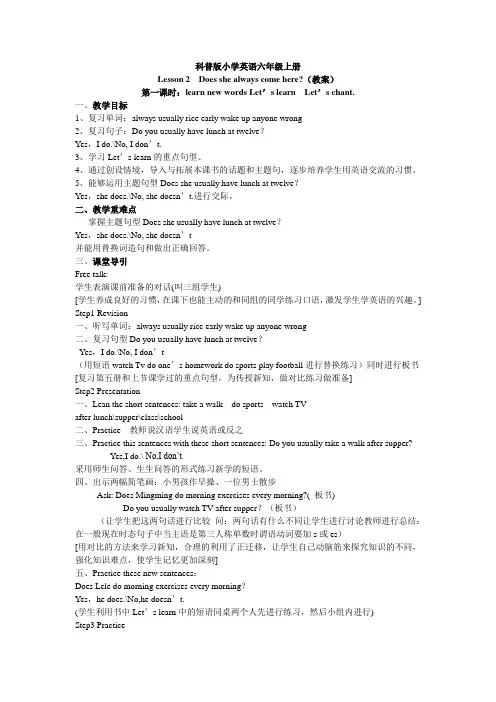
科普版小学英语六年级上册Lesson 2 Does she always come here?(教案)第一课时:learn new words Let’s learn Let’s chant.一、教学目标1、复习单词:always usually rice early wake up anyone wrong2、复习句子:Do you usually have lunch at twelve?Yes,I do.\No, I don’t.3、学习Let’s learn的重点句型。
4、通过创设情境,导入与拓展本课书的话题和主题句,逐步培养学生用英语交流的习惯。
5、能够运用主题句型Does she usually have lunch at twelve?Yes,she does.\No, she doesn’t.进行交际。
二、教学重难点掌握主题句型Does she usually have lunch at twelve?Yes,she does.\No, she doesn’t并能用替换词造句和做出正确回答。
三、课堂导引Free talk:学生表演课前准备的对话(叫三组学生)[学生养成良好的习惯,在课下也能主动的和同组的同学练习口语,激发学生学英语的兴趣。
] Step1 Revision一、听写单词:always usually rice early wake up anyone wrong二、复习句型Do you usually have lunch at twelve?Yes,I do.\No, I don’t(用短语watch Tv do one’s homework do sports play football进行替换练习)同时进行板书[复习第五册和上节课学过的重点句型,为传授新知,做对比练习做准备]Step2 Presentation一、Lean the short sentences: take a walk do sports watch TVafter lunch\supper\class\school二、Practice 教师说汉语学生说英语或反之三、Practice this sentences with these short sentences: Do you usually take a walk after supper?Yes,I do.\ No,I don’t.采用师生问答、生生问答的形式练习新学的短语。
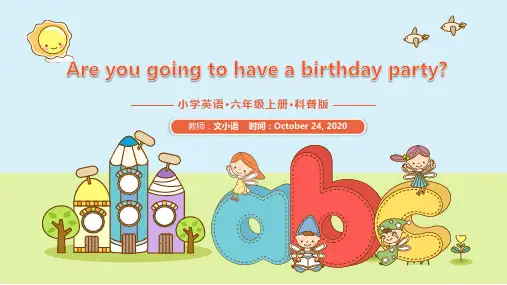
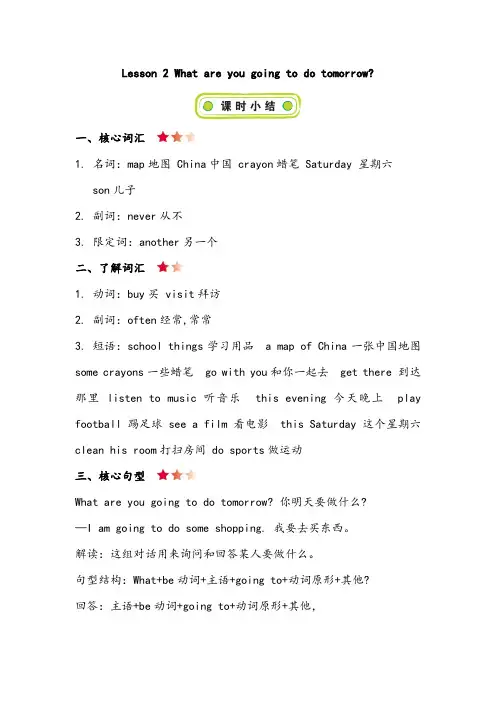
Lesson 2 What are you going to do tomorrow?一、核心词汇1. 名词:map地图 China中国 crayon蜡笔 Saturday 星期六son儿子2. 副词:never从不3. 限定词:another另一个二、了解词汇1. 动词:buy买 visit拜访2. 副词:often经常,常常3. 短语:school things学习用品 a map of China一张中国地图some crayons一些蜡笔 go with you和你一起去 get there 到达那里 listen to music听音乐 this evening今天晚上 play football踢足球 see a film看电影 this Saturday这个星期六clean his room打扫房间 do sports做运动三、核心句型What are you going to do tomorrow? 你明天要做什么?—I am going to do some shopping. 我要去买东西。
解读:这组对话用来询问和回答某人要做什么。
句型结构:What+be动词+主语+going to+动词原形+其他?回答:主语+be动词+going to+动词原形+其他,举一反三:—What are you going to do next Sunday? 你下个星期日要做什么?—I’m going to play football. 我要踢足球。
—What is he going to do this afternoon? 他今天下午要做什么? —He’s going to visit his friend. 他要拜访他的朋友。
四、了解句型Do you want to know why? 你想知道为什么吗?解读:这是询问某人是否想要做某事的句子。
句型结构:Do you want to +动词原形+其他?举一反三:Do you want to watch TV? 你想看电视吗?。
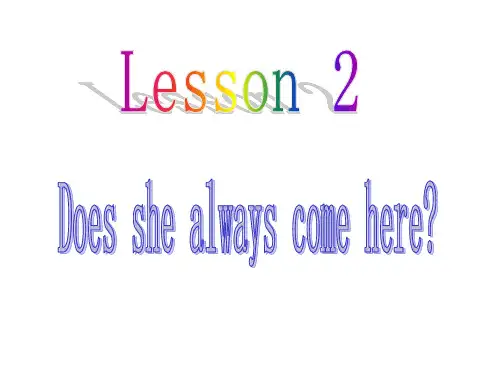
科普版六年级上册英语lesson two1. Lesson Two: My Daily Routine在六年级上册的英语课程中,Lesson Two: My Daily Routine是一个非常重要的主题。
通过学习这一课,学生将会学习如何描述自己的日常生活,以及学习一些关于动词和时间状语的知识。
这些内容对于学生的日常交流和写作能力的提高具有重要意义。
2. 评估在深度和广度的要求下,我们首先要对Lesson Two: My Daily Routine进行全面评估。
这包括课文内容的分析、相关语法和词汇的学习,以及对学生日常生活描述能力的提升等方面进行评估。
3. 课文内容分析我们来看一下Lesson Two中的课文内容。
这一课主要是以介绍学生的日常生活为主题,通过描述不同时间段内的活动,使学生学会如何用英语表达自己的日常生活。
课文通过丰富的图片和简洁清晰的文字,使学生能够直观地了解居住在不同国家的孩子们的日常生活。
这样的设计有利于学生对课文内容的理解和记忆。
4. 语法和词汇学习在课文内容的基础上,Lesson Two还涉及了一些关于动词和时间状语的知识。
学生将学习到一些常见的动词,如brush, eat, go等,以及一些常用的时间状语,如in the morning, at noon, in the afternoon等。
学生还需要掌握一些基础的句型结构,如主谓宾结构等。
这些知识的学习对于学生的基础英语能力的提升非常重要。
5. 学生日常生活描述能力的提升通过学习Lesson Two,学生将会得到描述自己日常生活的能力。
他们可以用所学到的词汇和句型来描述自己的日常起居,包括起床、吃早饭、上学、放学等各个方面。
这将有助于学生在日常交流和书面表达中更加流利地运用英语。
6. 总结和回顾Lesson Two: My Daily Routine是一节内容丰富、有趣且实用的课程。
学生不仅可以学到描述日常生活的能力,还可以掌握一些基础的语法和词汇知识。
Lesson 2 What are you going to dotomorrow?主备人:于露晨教学要求1、能听懂、会说、会认读,并能根据中文写出英文:map, China, crayon, Saturday, son。
只要求能听、说、认,不要求拼写:never, another。
2、能理解和掌握一般将来时“be going to +动词原形”结构各人称的特殊疑问句及其回答:What are you going to do tomorrow?I am going to do some shopping.What’s he going to do?He’s going to buy some school things.3、能听懂、会说,并能用来进行会话:If you say you are going to do something, then do it.4、能理解故事大意,并能根据回答与课文内容有关的问题及能根据图片和所给关键词复述。
Mr Going-to-do教学重难点1、单词的记忆。
2、一般将来时各人称的理解和应用。
教具准备多媒体课件教学时间四课时教学过程第一课时1、warm-up1) Free talk2) 复习第一课的单词。
2、Words1)听录音,默读单词2)讲解单词3)听录音,跟读单词4)男女生合作读单词5)齐读单词3、Let’s talk1)导入新课通过“去购物”的话题导入新课。
听录音,默读课文。
2)讲解课文3)男女生分角色读课文4)自读课文5)根据出示的关键词尝试分组复述课文6)全体学生根据关键词复述课文7)单个学生根据关键词复述课文作业布置两人一组练习对话,并准备表演。
板书设计map China crayon Saturday son第二课时1、复习检查:1)听写单词。
2)根据关键词复述课文。
3)两人一组表演对话。
2、Let’s learn:1)讲解出现的短语及生词。
2)根据句型进行替换练习,注意肯定句、否定句、一般疑问句及回答,每种句型都要有替换。